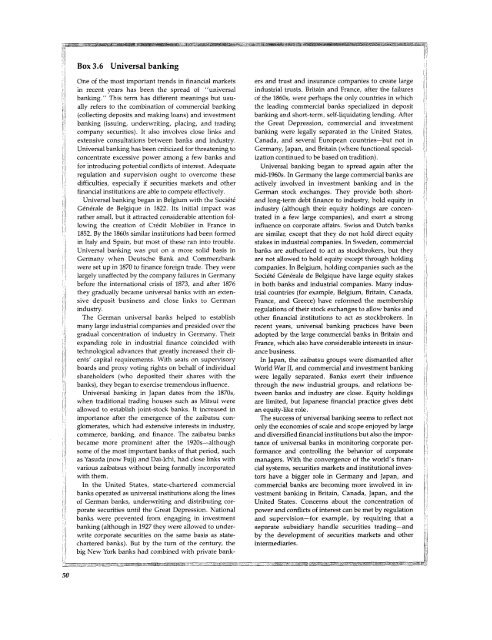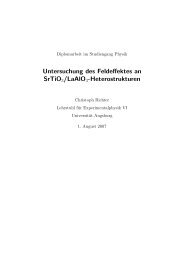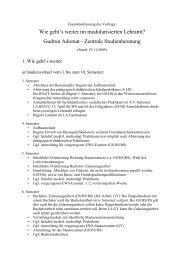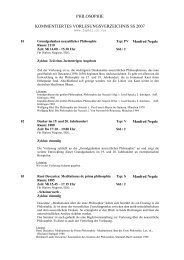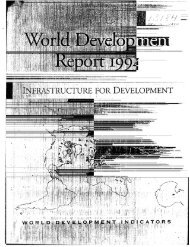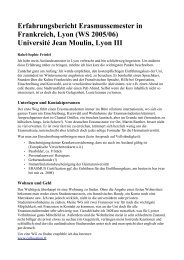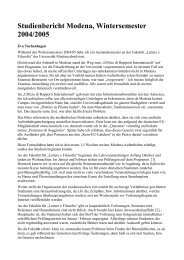Financial systems and development
Financial systems and development
Financial systems and development
You also want an ePaper? Increase the reach of your titles
YUMPU automatically turns print PDFs into web optimized ePapers that Google loves.
Box 3.6 Universal banking<br />
One of the most important trends in financial markets ers <strong>and</strong> trust <strong>and</strong> insurance companies to create large<br />
in recent years has been the spread of "universal industrial trusts. Britain <strong>and</strong> France, after the failures<br />
banking." This term has different meanings but usu- of the 1860s, were perhaps the only countries in which<br />
ally refers to the combination of commercial banking the leading commercial banks specialized in deposit<br />
(collecting deposits <strong>and</strong> making loans) <strong>and</strong> investment banking <strong>and</strong> short-term, self-liquidating lending. After<br />
banking (issuing, underwriting, placing, <strong>and</strong> trading the Great Depression, commercial <strong>and</strong> investment<br />
company securities). It also involves close links <strong>and</strong> banking were legally separated in the United States, K<br />
extensive consultations between banks <strong>and</strong> industry. Canada, <strong>and</strong> several European countries-but not in<br />
Universal banking has been criticized for threatening to Germany, Japan, <strong>and</strong> Britain (where functional special-,<br />
concentrate excessive power among a few banks <strong>and</strong> ization continued to be based on tradition).<br />
for introducing potential conflicts of interest. Adequate Universal banking began to spread again after the<br />
regulation <strong>and</strong> supervision ought to overcome these mid-1960s. In Germany the large commercial banks are<br />
difficulties, especially if securities markets <strong>and</strong> other actively involved in investment banking <strong>and</strong> in the<br />
financial institutions are able to compete effectively. German stock exchanges. They provide both short-<br />
Universal banking began in Belgium with the Soci6t6 <strong>and</strong> long-term debt finance to industry, hold equity in<br />
Gen6rale de Belgique in 1822. Its initial impact was industry (although their equity holdings are concenrather<br />
small, but it attracted considerable attention fol- trated in a few large companies), <strong>and</strong> exert a strong<br />
lowing the creation of Cr6dit Mobilier in France in influence on corporate affairs. Swiss <strong>and</strong> Dutch banks<br />
1852. By the 1860s similar institutions had been formed are similar, except that they do not hold direct equity<br />
in Italy <strong>and</strong> Spain, but most of these ran into trouble. stakes in industrial companies. In Sweden, commercial<br />
Universal banking was put on a more solid basis in banks are authorized to act as stockbrokers, but they<br />
Germany when Deutsche Bank <strong>and</strong> Commerzbank are not allowed to hold equity except through holding<br />
I were set up in 1870 to finance foreign trade. They were companies. In Belgium, holding companies such as the<br />
i largely unaffected by the company failures in Germany Societ6 Gen6rale de Belgique have large equity stakes<br />
before the international crisis of 1873, <strong>and</strong> after 1876 in both banks <strong>and</strong> industrial companies. Many industhey<br />
gradually became universal banks with an exten- trial countries (for example, Belgium, Britain, Canada,<br />
sive deposit business <strong>and</strong> close links to German France, <strong>and</strong> Greece) have reformed the membership<br />
industry.<br />
regulations of their stock exchanges to allow banks <strong>and</strong><br />
The German universal banks helped to establish other financial institutions to act as stockbrokers. In<br />
many large industrial companies <strong>and</strong> presided over the recent years, universal banking practices have been<br />
gradual concentration of industry in Germany. Their adopted by the large commercial banks in Britain <strong>and</strong><br />
exp<strong>and</strong>ing role in industrial finance coincided with France, which also have considerable interests in insurtechnological<br />
advances that greatly increased their cli- ance business.<br />
ents' capital requirements. With seats on supervisory In Japan, the zaibatsu groups were dismantled after<br />
boards <strong>and</strong> proxy voting rights on behalf of individual World War II, <strong>and</strong> commercial <strong>and</strong> investment banking<br />
shareholders (who deposited their shares with the were legally separated. Banks exert their influence<br />
banks), they began to exercise tremendous influence. through the new industrial groups, <strong>and</strong> relations be-<br />
Universal banking in Japan dates from the 1870s, tween banks <strong>and</strong> industry are close. Equity holdings<br />
when traditional trading houses such as Mitsui were are limited, but Japanese financial practice gives debt<br />
allowed to establish joint-stock banks. It increased in an equity-like role.<br />
importance after the emergence of the zaibatsu con- The success of universal banking seems to reflect not<br />
glomerates, which had extensive interests in industry, only the economies of scale <strong>and</strong> scope enjoyed by large -<br />
commerce, banking, <strong>and</strong> finance. The zaibatsu banks <strong>and</strong> diversified financial institutions but also the imporbecame<br />
more prominent after the 1920s-although tance of universal banks in monitoring corporate persome<br />
of the most important banks of that period, such formance <strong>and</strong> controlling the behavior of corporate<br />
as Yasuda (now Fuji) <strong>and</strong> Dai-lchi, had close links with managers. With the convergence of the world's finanvarious<br />
zaibatsus without being formally incorporated cial <strong>systems</strong>, securities markets <strong>and</strong> institutional inveswith<br />
them. tors have a bigger role in Germany <strong>and</strong> Japan, <strong>and</strong><br />
In the United States, state-chartered commercial commercial banks are becoming more involved in inbanks<br />
operated as universal institutions along the lines vestment banking in Britain, Canada, Japan, <strong>and</strong> the<br />
of German banks, underwriting <strong>and</strong> distributing cor- United States. Concerns about the concentration of<br />
porate securities until the Great Depression. National power <strong>and</strong> conflicts of interest can be met by regulation<br />
banks were prevented from engaging in investment <strong>and</strong> supervision-for example, by requiring that a<br />
banking (although in 1927 they were allowed to under- separate subsidiary h<strong>and</strong>le securities trading-<strong>and</strong><br />
1 write corporate securities on the same basis as state- by the <strong>development</strong> of securities markets <strong>and</strong> other<br />
chartered banks). But by the turn of the century, the intermediaries.<br />
big New York banks had combined with private bank-<br />
50


